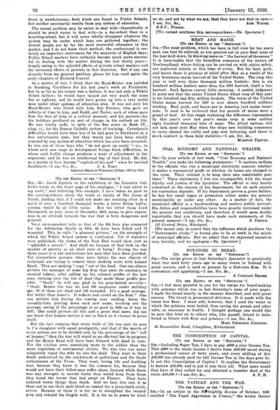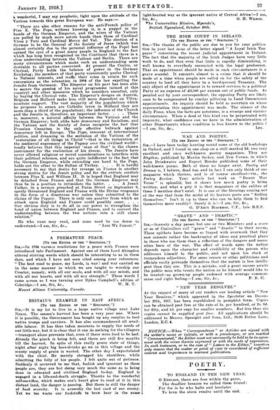THE VATICAN AND THE WAR.
• [To THE EDITOFt or THE " SPICIATOR."] Sui,—In an article in the Fatnightly Review of October, 1906. entitled "The Papal Aggression in France," the writer throws
it wonderful, I may say prophetic, light upon the attitude of the Vatican towards this great European war. He says:— "There are also other reasons for the antiTrench policy of Pius" X. The Pope, without knowing it, is a puppet in the hands of the German Emperor, and the wires of the Vatican are pulled by much more astute hands than those of Cardinal Vives y Tuto and Cardinal Merry del Val. The election of a German to be the General of the Society of Jesus (which was almost certainly due to the personal influence of the Pope) has opened the eyes of a great many people in England to the fact which has long been reCognised on the Continent that there is a close understanding between the Vatican and Berlin. There are many circumstances which make such an understanding seem desirable to all parties concerned. At present the Centre, or Clerical, Party holds the balance of power in the German Reichstag; the members of that party consistently prefer Clerical to National interests, and traffic their votes in return for such concessions as the relaxation in 1904 of the law expelling the Jesuits from Germany. The Emperor on his part has been able to secure the passing of his naval programme (aimed at this country) and other measures which he considers essential, only by buying the Clerical vote. The Emperor's designs on Austria, Belgium and Holland make him still more dependent on Ultra- montane support. The vast majority of the populations which he proposes to annex are Catholic (even in Holland they are more than a third of the population); the influence of the Church and the Jesuits is, therefore, an important factor. . . . There is, moreover, a natural affinity between the Vatican and the German Emperor; both alike hate democracy and Socialism, and the Vatican and the Society of Jesus recognise the fact that Prussian Cassarism is the only effective bulwark against democracy left in Europe. The Pope, innocent of international politics, and dreaming in the seclusion of the Vatican of the 'restoration of all things in Christ '—that is the restoration of the mediaeval supremacy of the Papacy over the civilised world— fondly believes that this imperial 'man of God' is the chosen instrument for 'the realisation of his dream. The Jesuits have never allowed religious or moral considerations to interfere with their political schemes, and are quite indifferent to the fact that the German Emperor, while extending one hand to the Pope, holds out the other to the Sultan of Turkey. . . . It is hardly necessary to say that desire for revenge on France is another strong motive for the Jesuit policy and for the entente cordiale between Pius X. and William II. It is hoped that England may be detached from France and that the German Emperor may thus be in a position to intimidate the latter. . . . A Jesuit Father, in a sermon preached at Farm Street on September 9, openly threatened England and France with the Divine vengeance in the form of a disastrous war unless they submitted to the claims of the Papacy. There is only one quarter from which an attack upon England and France could possibly come. . . . Our obvious duty is to do all in our power to strengthen the bond of union between England and France, and to convert the understanding between the two nations into a still closer relation."
He who runs may read, and none need be too dense to



























 Previous page
Previous page